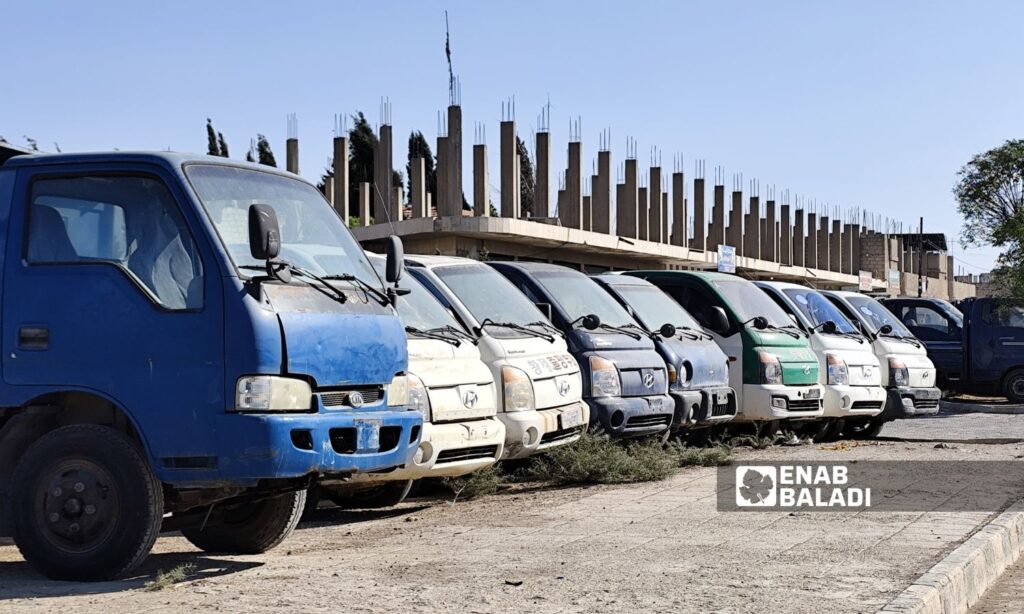Enab Baladi – Ras al-Ain
The car markets in the city of Ras al-Ain are experiencing a slowdown in sales and purchases, despite a gradual decline in car prices since mid-2023.
Car dealers interviewed by Enab Baladi attributed the stagnation to weak agricultural seasons and the poor marketing of these products, which led to a decline in purchasing power among a large segment of the population, who are focusing on primary family needs.
Market stagnation
Samir al-Darwish, a car broker, told Enab Baladi that the activity in the market has seen a noticeable decline, as he hasn’t been able to close any car sales deals in the past six months.
Al-Darwish explained that the market stagnation and decreased demand are due to the high cost of living, the decline in agricultural activity, and some people’s desire to purchase cars on credit.
He pointed out that many customers hesitate to make large purchases like cars, resulting in a noticeable decrease in the deals he conducts.
Enab Baladi obtained a list of car prices in Ras al-Ain, which showed a significant decrease between 2023 and 2024.
Family needs first
The deteriorating economic conditions play a major role in reducing people’s ability to buy new or used cars. Many families in Ras al-Ain find themselves compelled to allocate their financial resources to meet basic needs.
Mohammad Azzo, a resident of Ras al-Ain, told Enab Baladi that he wanted to buy a car, but the difficult living conditions and high prices in the area made it impossible for him.
Azzo, who works in agriculture, explained that this year’s agricultural season was weak, and he couldn’t market his grain crop to the Syrian Interim Government (SIG), as only limited amounts of durum wheat were received.
He considered that owning a motorcycle has become a major challenge despite the falling prices in the markets, so how about owning a car, especially since the cost of fuel and maintenance is also burdensome.
A liter of butane gasoline is sold for 17,000 Syrian pounds, distilled petrol for 16,000 pounds, and regular (refined by burners) gasoline for 13,000 pounds. European and Turkish gasoline is sold for 23,000 Syrian pounds (55 Turkish liras).
A liter of regular (refined by burners) diesel sells for 12,000 Syrian pounds, refined diesel, and heavy diesel used for heating and cooking sells for 10,000 pounds, and European and Turkish diesel sells for 17,000 Syrian pounds (40 Turkish liras).
Daily labor wages range between 80,000 and 100,000 Syrian pounds, and most of the region’s residents, numbering around 115,000, work in agriculture and livestock farming.
Discounts with no effect
The stagnation remains, despite car showroom owners in Ras al-Ain offering additional discounts and payment facilities to attract customers.
Ali al-Hassan, a car showroom owner in Ras al-Ain, said he offered discounts of up to 35% on cars, but they did not achieve any positive results.
He told Enab Baladi that the economic stagnation and low overall income in the region had impacted the market activity.
Al-Hassan pointed out that he could not sell more than two cars a month and resorted to selling cars on credit to facilitate purchases for customers. However, this method caused him significant financial losses since most residents rely on agriculture and were unable to pay the remaining dues due to the failure to market crops.
Cars enter Ras al-Ain from Turkey through the Ras al-Ain border crossing, where customs duties range between 150 and 400 US dollars, depending on the car model and year.
Turkey allows car dealers in Ras al-Ain to import used European cars and pass through its territory up to ten years from the date of issuance. Cars produced after this date require special permission to enter through Turkish territory into Ras al-Ain.
Registration costs too
The costs are not limited to the car value only. There are decisions from the local council to register people’s vehicles with the local council’s Directorate of Transport, under penalty of impoundment and financial fines for violators.
In case of non-registration, the authorities seize unregistered vehicles and impound them in the impound garage.
To release the impounded vehicle, the owner must pay a fine of 2,000 Turkish liras to the council’s financial directorate, in addition to registering the vehicle properly.
According to a report prepared by Enab Baladi, the costs of vehicle registration vary according to the vehicle, including motorcycles costing 160 Turkish liras, private small trucks 450 liras, general small trucks 600 liras, agricultural vehicles 250 liras, and transport trucks 1300 liras.
Last June, a source from the Directorate of Transport told Enab Baladi that the number of registered vehicles in Ras al-Ain reached 24,450 vehicles, and the number is increasing daily due to residents’ willingness to register their cars.

